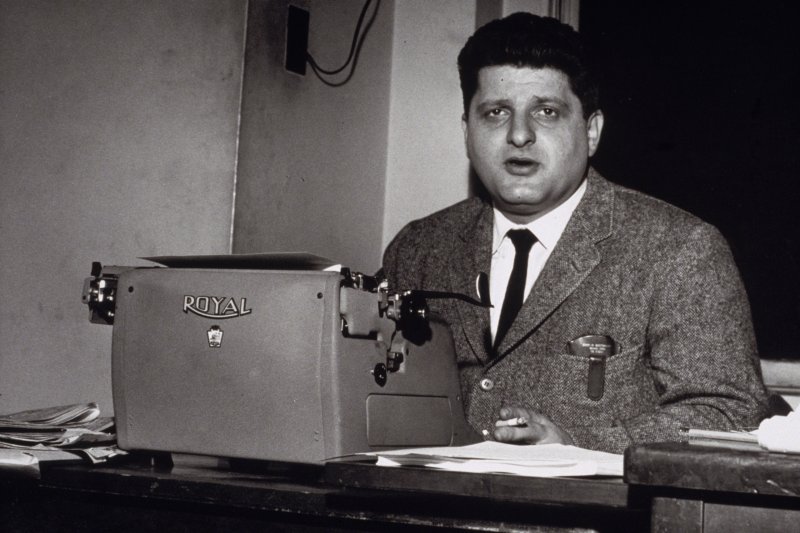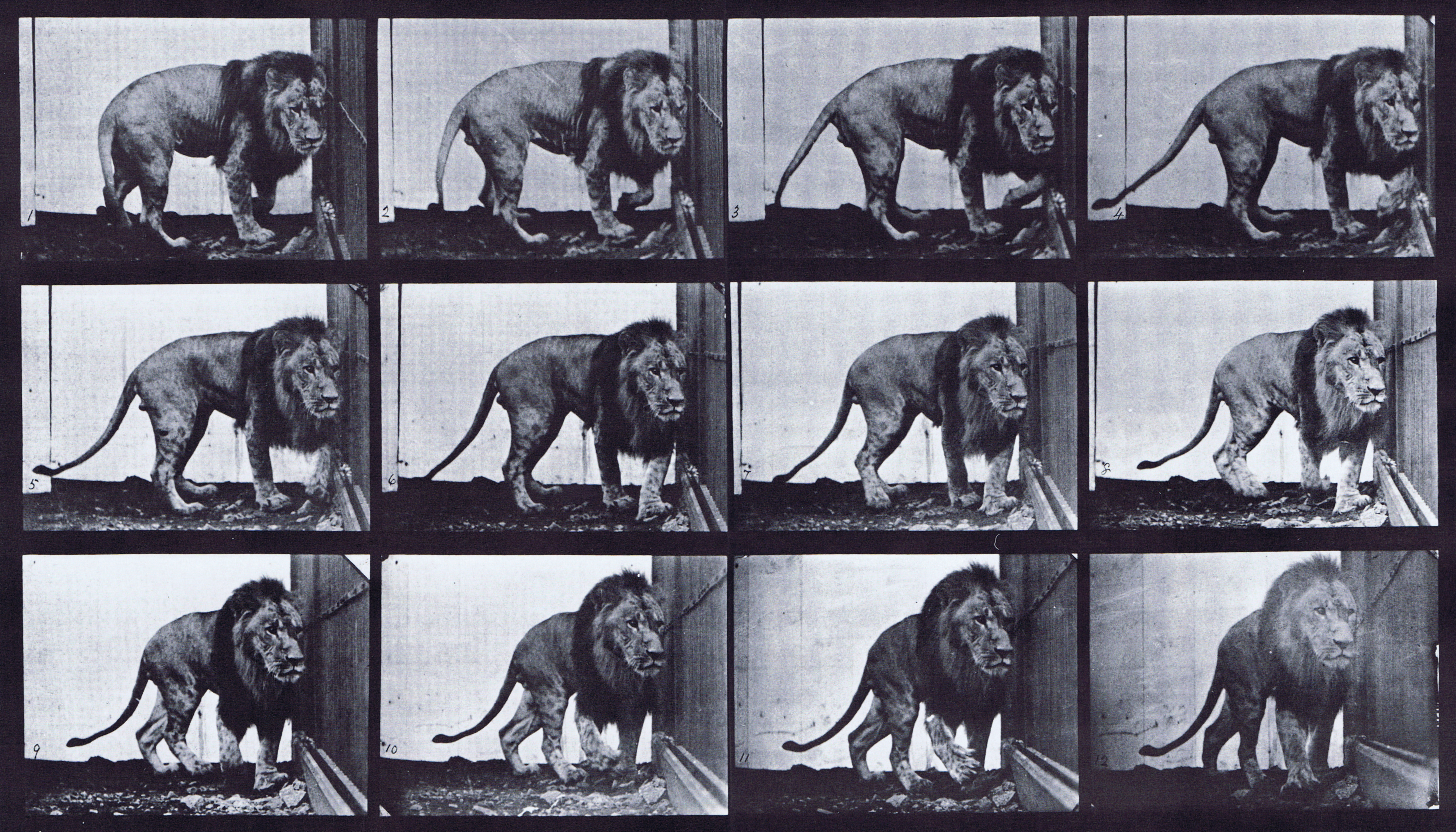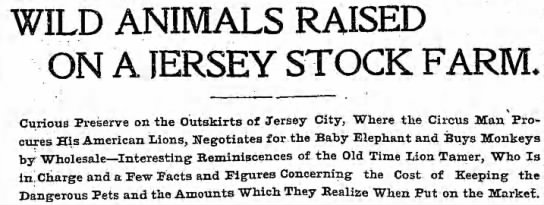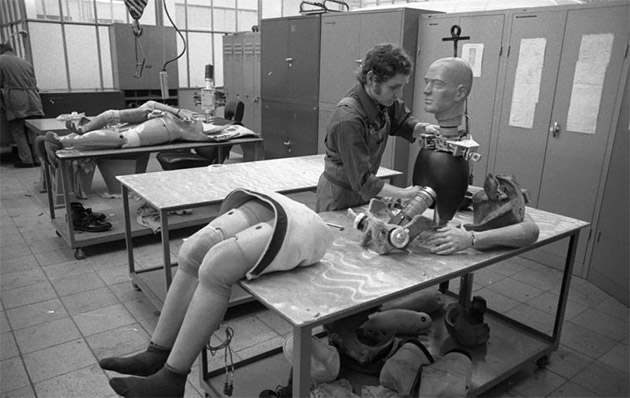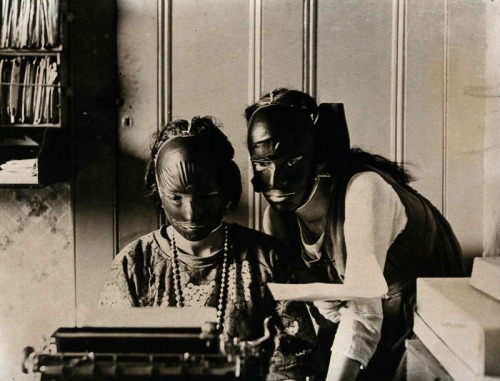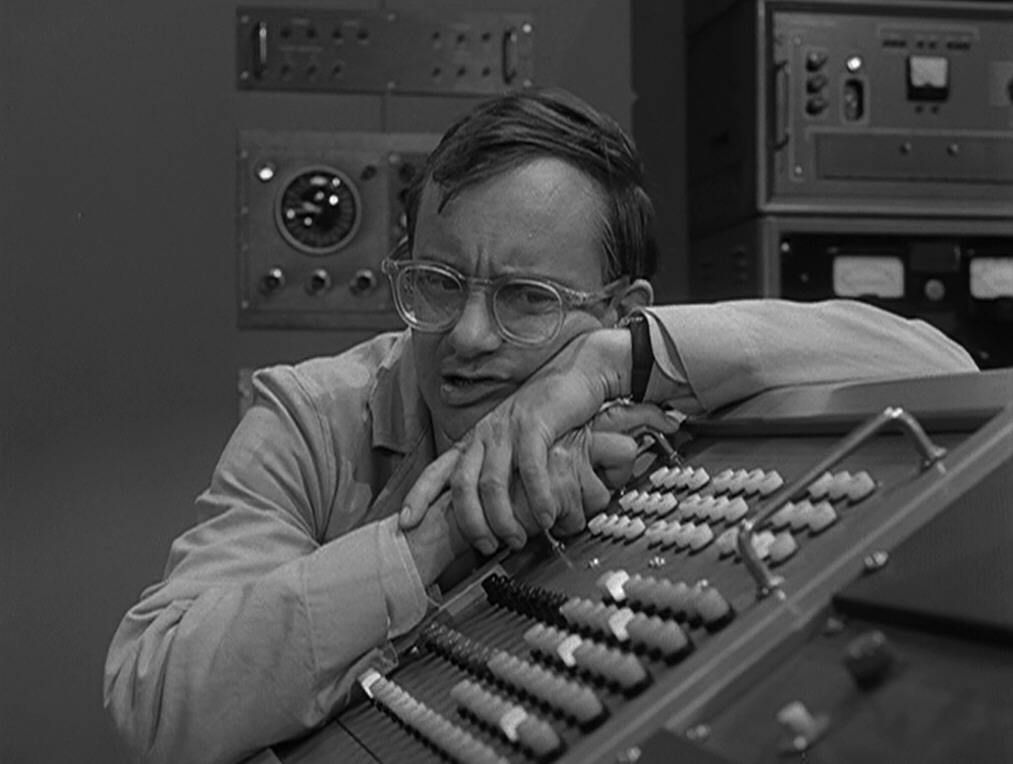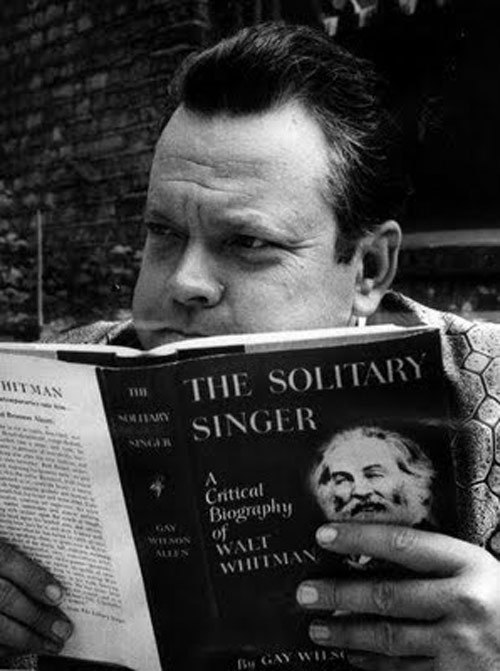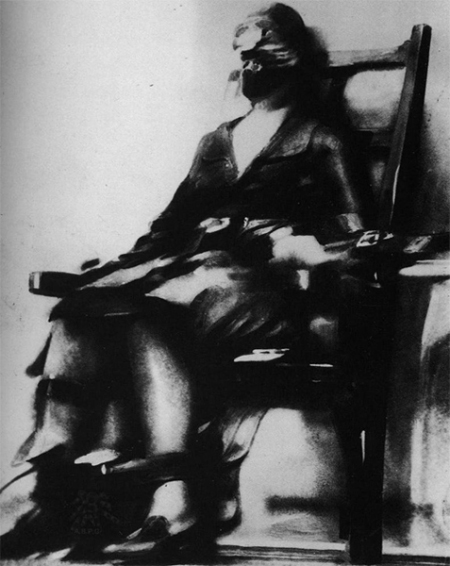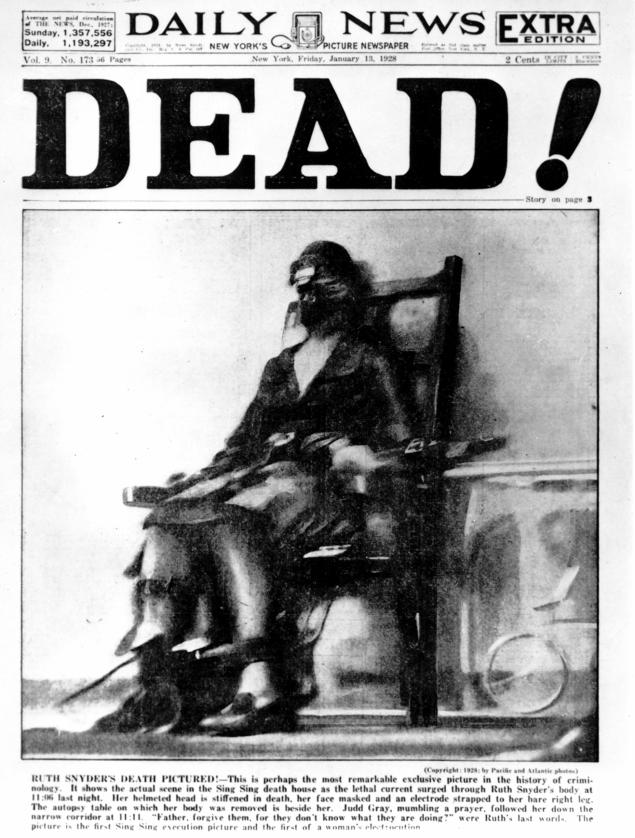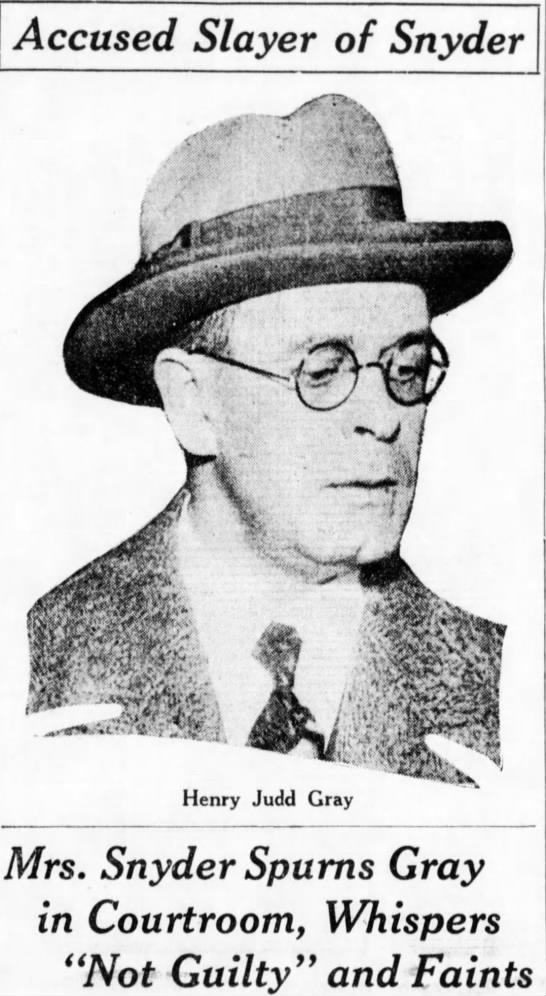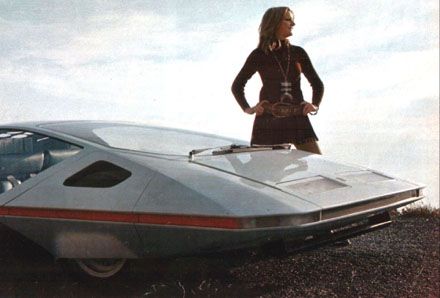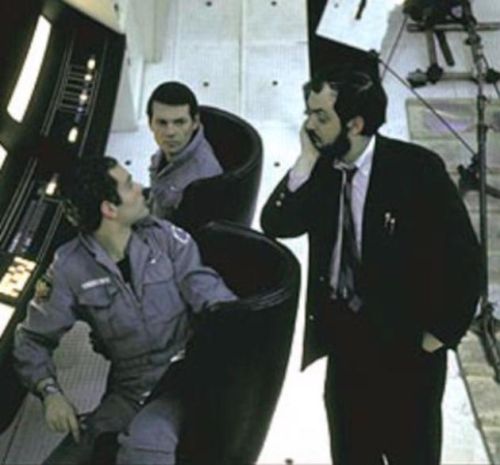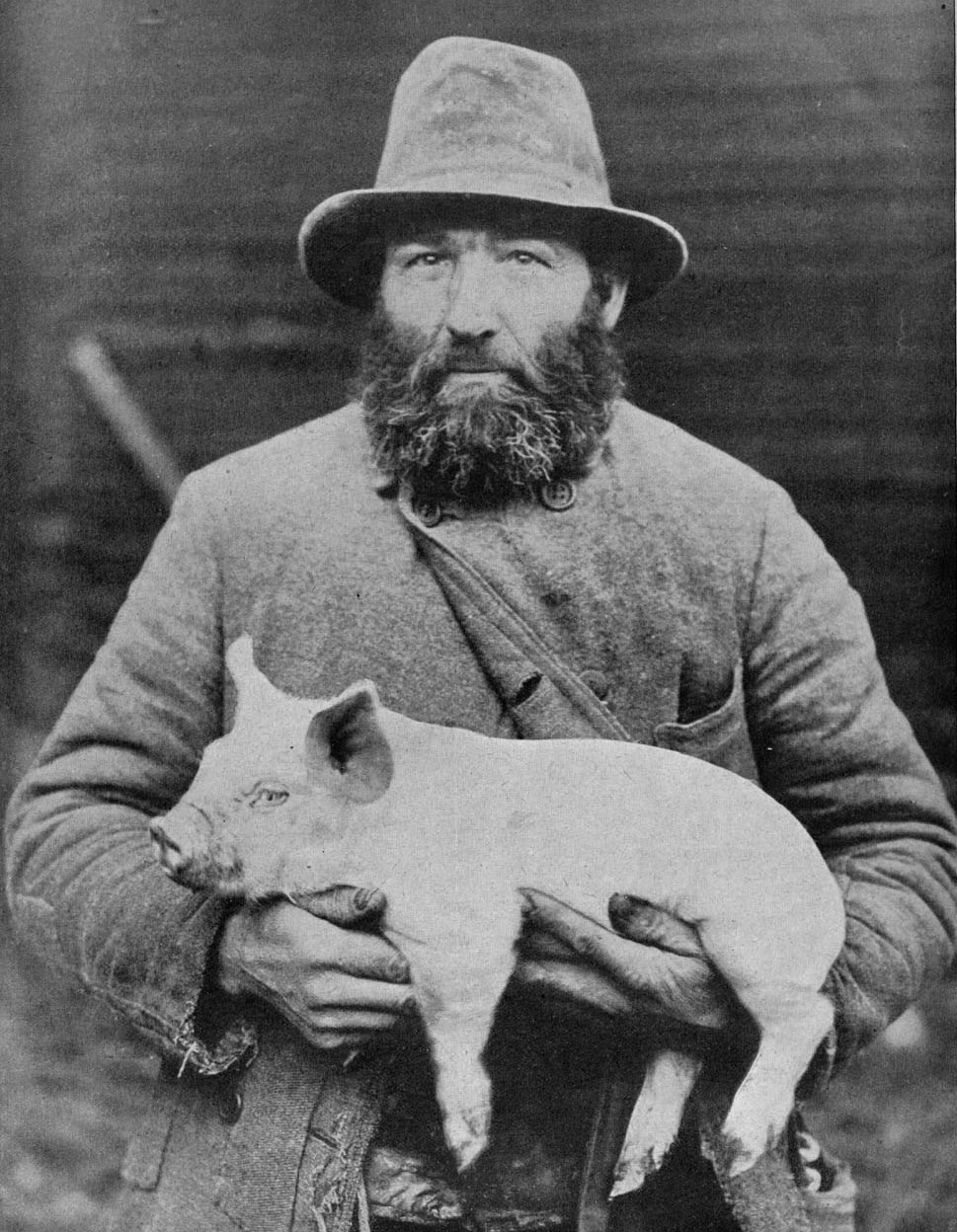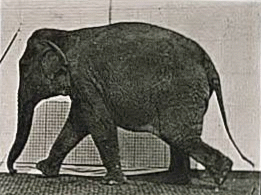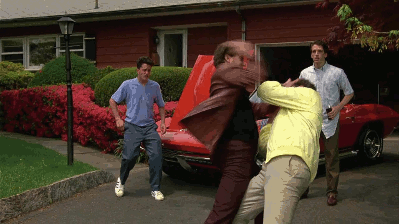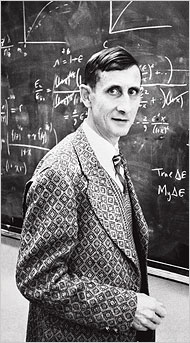Well, you can’t get a much more top-shelf Oscars moment than this passage from the 1977 ceremony, as Jane Fonda introduces Norman Mailer who in turn presents the Best Original Screenplay award to Paddy Chayefsky for Network. Mailer sets up the announcing of the nominees with the famous anecdote about Voltaire visiting a gay bordello. Despite what Aquarius says, it was more way more difficult for Chayefsky to write a great novel than a great screenplay.
Tags: Jane Fonda, Norman Mailer, Paddy Chayefsky
According to Felix McDonald, a Brit expat who was raised in a circus and worked as a lion tamer for three decades, the most expensive animals desired by exhibitors and collectors in fin de siècle New York were the giraffe and the gorilla. He would have been privy to such information as he managed a wild-animal farm in New Jersey which stocked circuses and private zoos and such. Of course, as he pointed out in an article in the February 11, 1900 Brooklyn Daily Eagle, domesticated animals capable of producing revenue regularly sold for more than the rarest of species.
Tags: Felix McDonald
Granta has an excerpt called “Drone” from a forthcoming Hari Kunzru novel, a dystopian nightmare about an India in which income inequality and runaway technology are extrapolated to extremes, those of enormous wealth living in stupendous towers above the ruined earth. In this passage, a poor miner named Jai opts for human augmentation to enable survival:
One evening, he goes to buy himself an arm. It’s a common enough transaction. Most people on earth are augmented. You can increase your strength, overclock your reaction time or your lung capacity, multiply your attention span. You can cosmetically alter your face, reskin your body in the latest colours. You can augment your perception, overlaying the hideous environment of your mining camp with a pristine rainforest or an educational maze or a hypersexual forest of organs and limbs. Elsewhere in the world, people have changed themselves in ways these miners can only dream about. The rich are fantastical creatures, young gods living in a customized world, generating themselves and their environment out of the stuff of their desires. Not this, that. Not that, this. For the less fortunate there are wealth-sims and optical overlays that make cramped living spaces feel spacious, cosmetically luxurious. You may be exhausted and feeding yourself textured algae, but you’re doing it in a marble throne room.
Jai, like everyone, worries that he’s falling behind. Other miners stimulate their muscle growth, or use cheap mechanical prosthetics with docks for attaching tools. One or two have elaborate biomechanical grafts, though these many-armed, monstrously sized men are usually enslaved by the militias and are so psychologically alienated that they can’t properly be called human any more. Jai is young and strong. He has the body he was born with, a body which has been constructed entirely by chance, without selection or surgery or fetal therapies, with a variable food supply, patchy shelter and unrestricted exposure to diseases and swarms of all kinds. He is miraculously healthy, but can’t seem to make enough money to survive. Sometimes he goes hungry. He struggles to pay the water boys.
The prosthetician is based in a highly entropic zone of the camp, the informal red-light district known as the Cages. It’s a quarter that has spawned a hundred slang terms for process, words for every type and quality of peak, dip, spread and intensification. As Jai squeezes through a decaying alley, a flock of what look like geese with glandes instead of heads skitter past him. Who knows where they came from, but they’re ubiquitous in the Cages. The miners call them ‘dickchickens’. Whores grafted into the walls display available orifices or scroll out stims that grab the crotch or flicker and bounce off the eye like thrown business cards. Even the architecture is pink, moist to the touch; when it comes to overlays, miners tend to want the hard stuff. Cheap and heavy. Margaritaville. Pussytown. Jai is assaulted by a confusion of tacky skins and feelies, which override his permissions, come congaing through his field of vision, trying to trick him into giving out his credit strings. Phantom pudenda flourish and bloom. Semen spatters the optics of his sensorium. He is brushed by nipples, hair, lubricated hands.
He squeezes himself through a rectal crack into the limbmongers’ colony, the swarm of drones battering round him, thick and black. It fills the narrow alley. Machines get stuck underfoot or mashed into the deliquescent walls. The largest are the size of small birds, the tiniest mere hoverflies, with little iridescent solar sails for wings. As he is finally enclosed by the prosthetician’s stall, sheltered behind his firewall, the swarm forms a clicking, skittering crust on the transparent shell, jostling for a sight line.
The limbmonger is a sallow man with a double ridge of bone on his forehead and a cage of carbon fibre around his jaw, the platform for some kind of sensorium. As he shows Jai his wares he’s probably multitasking, climbing pre-thaw Everest or swapping feelies of cats. He has a telltale absence to his manner, a blankness. Of the various devices on offer, there’s only one Jai can afford, a contraption with a battered shovel, a claw, and some kind of twitch control that the man swears works perfectly, but which only seems to react intermittently to Jai’s instructing left shoulder.•
Tags: Hari Kunzru
I went to a Catholic grade school and was taught one year by a nun who had an old, empty bottle of Top Job filled with holy water which she would throw on us when we collectively misbehaved, trying, I suppose, to chase away the devil. Good fucking luck with that. By those modest standards, a version of the classroom of the future which is to be led by algorithms, as detailed in an NPR story by William Huntsberry, doesn’t sound half bad. An excerpt:
“The classroom of the future probably won’t be led by a robot with arms and legs, but it may be guided by a digital brain.
It may look like this: one room, about the size of a basketball court; more than 100 students, all plugged into a laptop; and 15 teachers and teaching assistants.
This isn’t just the future, it’s the sixth grade math class at David Boody Jr. High School in Brooklyn, near Coney Island. Beneath all the human buzz, something other than humans is running the show: algorithms.
The kind of complex computer calculations that drive our Google searches or select what we see on our Facebook pages.
Algorithms choose which students sit together. Algorithms measure what the children know and how well they know it. They choose what problems the children should work on and provide teachers with the next lesson to teach.
This combination of human capital and technology is called ‘blended learning.”•
Tags: William Huntsberry
A “gymnasium for the mind” or some such thing, the Orrb is an isolation tank-ish pod for the office in which workers can recuse themselves for a few meditative moments into a veritable womb. An immaculate white structure that’s five feet tall and seven feet long, it sort of looks like a giant, hungry iPhone, a Jony Ive whale ready for a meal of Jonahs. It’s meant to increase concentration, but dollars to doughnuts, guys will be whacking off in them. From Ben Schiller at Fast Company:
With all the distractions of modern life, it’s hard to think straight. We’re constantly under pressure from work and all the other daily complications, and often we forget to sit still and take a deep breath.
Hence the need for something like the Orbb, a womb-like cocoon for office spaces. It’s a place apart from the normal working environment—somewhere we can be ourselves again, even if it’s just for a few minutes.
“As companies encourage their employees to intermingle in open plan offices, they [run the risk] of taking that too far and you get a degradation of personal space,” argues Lee McCormack, founder of Orbb Technologies. “Ten years ago, it was 50-50 whether we needed this. Now it’s almost a necessity because we’re so bombarded with information overload and we need a private space in the office.”
The Orbb is a capsule with a lounge seat inside. The air is filtered to maximize oxygen levels and there’s a noise canceling system to maintain quiet. You sit back and close the door and begin to watch the screen in front of you. It will prompt you to take a breathing exercise, then guide you through a five-minute meditation. You can also take various self-development and learning modules—say, to build up your public speaking skills.•
Tags: Ben Schiller, Lee McCormack
Lee Miracle, commander of the Southern Michigan Volunteer Militia, is a complicated man. A veteran, libertarian, atheist and poet who doesn’t believe that government should prohibit gay marriage, he owns more than 20 guns and each of his seven-year-old daughters have their own “cute” firearm. In an interview conducted by Zachary Crockett of Priceonomics, Miracle comes across as basically reasonable, but if so he must be habitually naive about the kind of fringy people he’s associating with. An excerpt:
Question:
Exactly what kind of situations are you preparing for with your weaponry training?
Lee Miracle:
Okay. If I’m standing next to someone and he’s opening fire on a school playground, its my job to shoot. The first one on the scene has to step up.
If there’s someone in a shopping mall or a movie theatre or wherever, and they’re doing something bad — whether you’re in a militia or not, every citizen should engage and destroy the threat!
Question:
Have you ever had to do anything like that?
Lee Miracle:
No…so far, no. And I’m very grateful for that. My hope is that we will never have to use them.
We don’t wake up and hope that we have to pull out our revolvers. There’s a misconception that were champing at the bit to shoot something. Listen: if I woke up tomorrow and there was no terrorism in the world — that’s what I want. But the reality is there is bad stuff going on, there are criminals in our society — and you don’t deter that by being disarmed.
Question:
How many guns do you currently keep in your household?
Lee Miracle:
I’d have to check. At least 20-something.
Question:
Can you tell me a bit about how you ensure gun safety with your children in the house?
Lee Miracle:
I’ve got five kids still living at home. Every one of my kids except one has his or her own firearm; only one of my daughters, who has since moved out, doesn’t have one — and that’s just because she isn’t really into guns.
The little girls, who are seven each, each got their little single shot .22 ‘crickets’ — they’re very cute guns. We go to the range, and they know the rules of gun safety, they understand the seriousness. I’ll give them random tests — like say, ‘Clear this chamber for me’ — and they know what to do. I also train them. I’ll say, ‘Look what this shotgun does to a pumpkin or a 2×4; now imagine what it would do to a person’s head!’ They understand the seriousness.
Another one of my sons, who’s 16 years old, doesn’t have a gun right now because of his grades. His grades were poor, and I told him, ‘When you get your grades up, we’ll talk about it. In this household, you’re not armed: you need to reflect on that.’•
Tags: Lee Miracle, Zachary Crockett
From the February 7, 1926 Brooklyn Daily Eagle:
Berlin — Thousands of rats and mice, living unmolested in palatial splendor for a score of years, have ruined the interior of a 155-year-old castle of Schwerinsburg, near Ducherrow, Mecklenburg. The rodents had gnawed into woodwork, costly antique furniture, paintings and tapestries and played havoc even with the beautiful glass chandeliers. The purchaser, unable to spend $250,000 for repairs, again locked the doors and left the rats in undisputed possession.
A debate (by proxy) between Nicholas Carr and Andrew McAfee, two leading thinkers about the spreed of automation, takes place in Zoë Corbyn’s Guardian article about Carr’s most-recent book, The Glass Cage. I doubt the proliferation of Weak AI will ultimately be contained much beyond niches despite any good dissenting arguments. An excerpt:
As doctors increasingly follow automated diagnostic templates and architects use computer programs to generate their building plans, their jobs become duller. “At some point you turn people into computer operators – and that’s not a very interesting job,” Carr says. We now cede even moral choices to our technology, he says. The Roomba vacuum cleaning robot, for example, will unthinkingly hoover up a spider that we may have saved.
Not everyone buys Carr’s gloomy argument. People have always lamented the loss of skills due to technology: think about the calculator displacing the slide rule, says Andrew McAfee, a researcher at the MIT Sloan School of Management. But on balance, he says, the world is better off because of automation. There is the occasional high-profile crash – but greater automation, not less, is the answer to avoiding that.
Carr counters that we must start resisting the urge to increase automation unquestioningly. Reserving some tasks for humans will mean less efficiency, he acknowledges, but it will be worth it in the long run.•
Tags: Andrew McAfee, Nicholas Carr, Zoë Corbyn
Last month, I missed “The Age of the Anthropocene: Masters of Earth,” philosopher Stephen Cave’s excellent Financial Times piece about numerous recent books which weigh the sustainability of the human race in the face of bulging population and the environmental costs of our cleverness, which made possible the Industrial and Digital Revolutions. A piece about the perils of reengineering humans and geoengineering the environment, which riffs on new works by Diane Ackerman, Ruth DeFries and E.O. Wilson:
Ackerman takes us on a whimsical journey, at times directionless, but at others engaging and profound. Despite her resolute optimism, she is very much aware of the damage we cause, such as on the unlucky island of Guam in the western Pacific. She describes how problems began when a giant African snail, introduced to the island as a food source, spread to attack local crops; the authorities therefore introduced the carnivorous Florida wolfsnail to stop the plague — but the wolfsnail preferred the island’s indigenous snail species, 50 of which have now been made extinct, while their giant African cousin continues to destroy crops and native flora unimpeded.
This parable of incompetent meddling explains why many people profoundly object to the idea of geoengineering — attempting actively to manipulate the climate. Essentially, geoengineering is meddling on the grandest scale, such as spraying sulphur particles into the atmosphere to mimic the cooling effect of a volcanic eruption. It would be the definitive Anthropocene act, either innovating our way out of our problems or — just as likely — blundering into much worse ones.
Mindful of the law of unintended consequences, Wilson is sceptical of, for example, trying to re-engineer the human genome to make us better fitted for the future. Although we are flawed and have made quite a mess for ourselves, he argues that our imperfections and inner contradictions are also the source of the creativity that will lead to solutions. DeFries tells another nice story of incompetent meddling: an attempt in 1957 in the southern US to kill an invasive species of aggressive fire ants by using insecticides. This resulted in the eradication of native ant species, thereby clearing the way for the hardier fire ants to expand. The great naturalist, and ant-man, EO Wilson, described this at the time as the “Vietnam of entomology.” Now, in The Meaning of Human Existence, he gives his own take on the state of our species and the pros and cons of meddling.
Mindful of the law of unintended consequences, Wilson is sceptical of, for example, trying to re-engineer the human genome to make us better fitted for the future. Although we are flawed and have made quite a mess for ourselves, he argues that our imperfections and inner contradictions are also the source of the creativity that will lead to solutions.•
Tags: Diane Ackerman, E.O Wilson, Ruth DeFries, Stephen Cave
Nick D’Aloisio, a clever British college student and computer scientist whose company sold the so-so Summly news app to Yahoo in a very strange deal, began raising venture capital when he was just 15. The biggest red flag ever! Now 19, he dreams of predictive systems that answer our every question even before we’ve asked them. For a look at what (some of the) kids are thinking about these days, an excerpt from Ian Tucker’s Guardian interview with the wunderkind:
Question:
Are the visions of AI outlined by film-makers in movies like Her pretty good guesses of where we are heading?
Nick D’Aloisio:
I think Her is a pretty good guess. Not in terms of how it ends but the stuff about a virtual assistant which has a personality and can adapt around you. I think it won’t be as great as what it is in Her, but the Siri is now a very primitive example of what it can be. My dream is an assistant who would teach me about things around me. I think that’s coming in the next 10 or 20 years.
Question:
What do you mean by that?
Nick D’Aloisio:
So as I’m sitting at this table, it’s explaining about convection currents and the heat. It’s telling you what calories are in that chocolate eclair. If you say something I don’t understand it explains what that word means. It’s aware the whole time.
Question:
Sounds like more information overload.
Nick D’Aloisio:
I guess it is but it’s relevant information. Basically it’s a virtual brain. I would love that.
Question:
So we’re 10 years from a virtual brain?
Nick D’Aloisio:
I don’t know about the singularity but I think predictive systems are getting better at determining what you want to learn or what you want to ask.
Question:
The virtual brain knows what you want before you realise it yourself?
Nick D’Aloisio:
No, but without me having to actually input “what’s the weather like”?, it can tell from sensory data that my body temperature’s changed, and therefore I might be wondering why has the change happened. So it’ll tell me that the weather’s just dropped or whatever. There’s a lot of things you can do with prediction based on the sensory stuff. The Apple Watch is a great example of prediction through biometrics.•
Tags: Ian Tucker, Nick D’Aloisio
In “They’re Watching You Read,” a NYRB post, Francine Prose wonders about the ramifications, both political and personal, of e-book retailers being able to tell “which books we’ve finished or not finished, how fast we have read them, and precisely where we snapped shut the cover of our e-books and moved on to something else.” With online tracking of page-turning and highlighting, the very personal joy of reading becomes public. An excerpt:
For the time being, the data being gathered concerns general patterns of behavior rather than what happens between each of us and our personal E-readers. But we have come to live with the fact that anything can be found out. Today “the information” is anonymous; tomorrow it may well be just about us. Will readers who feel guilty when they fail to finish a book now feel doubly ashamed because abandoning a novel is no longer a private but a public act? Will it ever happen that someone can be convicted of a crime because of a passage that he is found to have read, many times, on his e-book? Could this become a more streamlined and sophisticated equivalent of that provision of the Patriot Act that allowed government officials to demand and seize the reading records of public library patrons?
As disturbing may be the implications for writers themselves. Since Kobo is apparently sharing its data with publishers, writers (and their editors) could soon be facing meetings in which the marketing department informs them that 82 percent of readers lost interest in their memoir on page 272. And if they want to be published in the future, whatever happens on that page should never be repeated.
Will authors be urged to write the sorts of books that the highest percentage of readers read to the end? Or shorter books? Are readers less likely to finish longer books? We’ll definitely know that. Will mystery writers be scolded (and perhaps dropped from their publishers’ lists) because a third of their fans didn’t even stick around long to enough to learn who committed the murder? Or, given the apparent lack of correlation between books that are bought and books that are finished, will this information ultimately fail to interest publishers, whose profits have, it seems, been ultimately unaffected by whether or not readers persevere to the final pages?•
Tags: Francine Prose
In what was otherwise an underwhelming Ask Me Anything at Reddit, Carlos Ghosn, the President and CEO of Renault and Nissan, a company that has promised to offer cars with autonomous drive by 2020, analyzed Google’s place in the driverless sector. The exchange:
Question:
Often when you hear “autonomous vehicles,” it is in the same sentence with Google. How do you see the search giant’s role in the future of autonomous vehicles?
Carlos Ghosn:
From time to time on a specific technology, companies can benefit from marketing/information halo. If you asked people today, what’s the best-selling electric car, many will say the Tesla. But really, it’s the Nissan LEAF — by far. Because of Tesla’s marketing strategy, it’s more visible to the public. They appear to be the leaders.
The Google car is more of a driverless car than an autonomous car. It would serve more of an economic purpose. Consider, for example, if Uber was able to drive their cars without drivers. There would be an economic purpose.
We are much more involved in autonomous drive. The driver is still in the car, but we want to make sure to make the driving experience is less stressful. We’re giving more power to the driver, to make the driving experience more pleasant.•
Tags: Carlos Ghosn
Ruth Snyder was a persistent if imprecise killer.
A Queens housewife who fell hard for married corset salesman Henry Judd Gray, Snyder failed the first seven times she attempted to murder her husband, Albert, finally garrotting her betrothed in 1927 with the aid of her lover, who, of course, had experience tightening fabric around flesh. The slaying was messy and the story she concocted for police about a home invasion even more so, so instead of collecting insurance money, Snyder was soon collecting dust in a prison cell. But not for long: A year later, she and her paramour were no more, silenced at Sing Sing by the hum of an electric chair.
Snyder was the first woman to die in the chair, and despite her vicious crime, her gender made her punishment shocking to many, even the executioner, and the picture of her being put to death, taken stealthily with a hidden ankle camera by New York Daily News photographer Tom Howard, is one of the most famous images in the history of journalism.
A postscript: Even after her death, Snyder had no luck with heat.
The following is the March 22, 1927 Brooklyn Daily Eagle account of her recanting her confession and entering a not-guilty plea.
Haunted Painting – $333
This painting belonged to a 35 year old man who practiced black magic before he hung himself in England. It was brought to the US in 1998 by his friend, who also died because of an accident. It has been through many owners since then and every owner had very unpleasant experiences with it. Its now with me since few weeks and its already caused much upheaval in my life. Destroyed peace of mind and happiness, lost job, lost my girl friend, strange and horrifying nightmares every night. It caused fights in my family, weird home life problems have cropped up. And caused health conditions to my brother. Nobody knows what it will do next.
Now I want to sell it. It has to GO to a new home and new owner.
Like Steve Jobs during his walkabout between stints as Apple’s visionary, Google’s Larry Page changed for the better in the years he spent in the shadow of Eric Schmidt, the CEO whom investors forced him to hire as “adult supervision.” Although Page still has none of the Apple co-founder’s charisma and communication skills, that social shortcoming might be a blessing some ways, since his vision of a future automated enough to satisfy Italo Balbo might give many pause, and should, despite Page’s good intentions. From Nicholas Carlson’s longform 2014 Business Insider profile of the search-giant leader’s second act:
During a keynote at a Google conference in 2013, Page said that in the long term — “you know, 50 years from now or something” — he hopes Google’s software will be able to “understand what you’re knowledgeable about, what you’re not, and how to organize the world so that the world can solve important problems.”
So, in Page’s vision, if you walk into your house and feel cold, your Google-powered wristwatch will be performing a search to understand that feeling. The search result will be for your Google-powered thermostat to turn up the heat.
Likewise, if you run out of milk and your Google-powered fridge notifies your Google-powered self-driving car to go collect some more from the Google-powered robots at the local grocery warehouse (no doubt paying with your Google wallet), it will all be a function of search.
The key to understanding the diversity of Google’s moonshots is understanding that Page’s vision of “perfect search” only works if all the products you interact with are compatible with one another.
For example, Google’s most advanced search product today, Google Now, is able to do things like alert Android users that they need to leave now if they are going to beat traffic and make a flight on time. But it can only do that because it has access to the Android users’ inboxes, Google Maps, Google Flight Search, Google Calendar, and, of course, the users’ smartphones.
So while it may seem random for Google to get into businesses as diverse as cars, thermostats, robotics, and TV production, there is an overriding objective behind it all: Page is envisioning a world where everything we touch is connected with and understood by an artificially intelligent computer that can discern patterns from our activity and learn to anticipate our needs before we even know we have them. Someday, Page has said several times, this AI will be hooked directly to our brains — perhaps through an implant.
Some of these ideas would scare people if Page were better at talking about them. He is, after all, directing billions of dollars every year toward making them a reality as quickly as possible. He’s said several times that Google should be employing 1 million engineers. With all of Google’s money, that’s actually possible.
The good news for the world is that Page’s goal of developing a pervasively connected AI that understands and provides for our every need is not about taking advantage of us.
He is, at heart, a passionate utopian — one who believes that technology has overwhelmingly made life better for humans and will only continue to do so.•
Tags: Larry Page, Nicholas Carlson
The future arrives in a hurry very seldom–it’s almost always a culmination. Molly Wood of the New York Times observed that the excitement of this year’s just-completed CES emanated not from new ideas but from the realizing of old ones. An excerpt:
This year’s CES had the feel of a World’s Fair. There were futuristic BMWs zipping around the streets surrounding the Las Vegas Convention Center, drones buzzing through the air inside and outside the convention center, and just about everywhere you looked a vision of roboticized homes that take perfect, synchronized care of their inhabitants. There was even 3-D-printed food.
It made for an exciting show, to be sure. There was an energy in the air in Las Vegas that had been lacking in previous years, helped by an influx of interesting start-ups, good conversations about a variety of technology and yes, even some really impressive TVs. It wasn’t, thank goodness, the same old thing.
And yet, in some ways, it was. The biggest trends of the year were actually technological concepts that have been around for decades, if not centuries.
Autonomous cars had their conceptual debut at an actual World’s Fair in 1939, where General Motors imagined a world of cars that were propelled along an automated highway system.
Similarly, attendees of the 1934 World’s Fair in Chicago saw a prototype of a home automation system that would later show up in science fiction stories like Ray Bradbury’s The Veldt and of course in The Jetsons.
As for virtual reality, cinematographers and scientists were actually building virtual reality devices at least as early as the 1960s. In 1962, Morton Heilig, the so-called father of virtual reality, patented the Sensorama — an immersive viewing system with a moving chair, a head-mounted display, stereo speakers and odor emitters. So 2015.•
Tags: Molly Wood
The wonderful Roxane Gay is made uneasy by #JesuisCharlie, but while I don’t concur with her, the disagreement won’t move me to violence.
The profanity of Voltaire and Buñuel and Bruce is just as important as their supposedly sacred targets, and the sacrosanct which isn’t open to ridicule is closed off and ready for a fall from grace. I wish during the 1950s people had been liberated enough to speak about the sexual abuse of children that was rampant in the Catholic Church. Plenty must have known. But just imagine the rebuke that would have rained down on those who dared such impiety. Who are they to ridicule the church?
From Gay’s new Guardian piece about the Hebdo aftermath:
I believe in the freedom of expression, unequivocally – though, as I have written before, I wish more people would understand that freedom of expression is not freedom from consequence. I find some of the work of Charlie Hebdo distasteful, because there is a preponderance of bigotry of all kinds in many of their cartoons’ sentiments. Still, my distaste should not dictate the work the magazine produces or anything else. The cartoonists at Charlie Hebdo – and writers and artists everywhere – should be able to express themselves and challenge authority without being murdered. Murder is not an acceptable consequence for anything.
Yet it is also an exercise of freedom of expression to express offense at the way satire like Charlie Hebdo’s characterizes something you hold dear – like your faith, your personhood, your gender, your sexuality, your race or ethnicity.
Demands for solidarity can quickly turn into demands for groupthink, making it difficult to express nuance. It puts the terms of our understanding of the situation in black and white – you are either with us or against us – instead of allowing people to mourn and be angry while also being sympathetic to complexities that are being overlooked.•
Tags: Roxane Gray
Via Nicholas Carr’s blog, Rough Type, I came across “HAL, Mother, and Father,” Jason Z. Resnikoff’s Paris Review post about his father’s generation, who, in 1968, viewed Stanley Kubrick’s sci-fi future, even his rogue computer, with techno-optimism, a feeling that short-circuited within a decade. An excerpt:
2001 is the brainchild of Stanley Kubrick and Arthur C. Clarke, who intended the film as a vision of things that seemed destined to come. In large part this fact has been lost on more recent generations of viewers who regard the movie as almost entirely metaphorical. Not so. The film was supposed to describe events that were really about to happen—that’s why Kubrick and Clarke went to such lengths to make it realistic, dedicating months to researching the ins and outs of manned spaceflight. They were so successful that a report written in 2005 from NASA’s Scientific and Technical Information Program Office argues that 2001 is today still “perhaps the most thoroughly and accurately researched film in screen history with respect to aerospace engineering.” Kubrick shows the audience exactly how artificial gravity could be maintained in the endless free-fall of outer space; how long a message would take to reach Jupiter; how people would eat pureed carrots through a straw; how people would poop in zero G. Curious about extraterrestrial life, Kubrick consulted Carl Sagan (evidently an expert) and made changes to the script accordingly.
It’s especially ironic because anyone who sees the film today will be taken aback by how unrealistic it is. The U.S. is not waging the Cold War in outer space. We have no moon colonies, and our supercomputers are not nearly as super as the murderous HAL. Pan Am does not offer commercial flights into high-Earth orbit, not least because Pan-Am is no more. Based on the rate of inflation, a video-payphone call to a space station should, in theory, cost far more than $1.70, but that wouldn’t apply when the payphone is a thing of the past. More important, everything in 2001 looks new. From heavy capital to form-fitting turtlenecks—thank goodness, not the mass fashion phenomenon the film anticipated—it all looks like it was made yesterday. But despite all of that, when you see the movie today you see how 1968 wasn’t just about social and political reform; people thought they were about to evolve, to become something wholly new, a revolution at the deepest level of a person’s essence.•
Tags: Jason Z. Resnikoff', Nicholas Carr
From the April 4, 1905 Brooklyn Daily Eagle:
“Mattituck, L.I. — L.C. Dayton, of this place, a well-known young farmer, has a freak pig with an elephant head and an elephant’s trunk. The little fellow was born two or three days ago, and lived but about two or three hours. It is now carefully preserved in alcohol, and is creating great interest among farmers, many of them driving several miles to see the curiosity.”
Tags: L.C. Dayton
- 5 Terrifying Secrets Of Hospital Emergency Rooms
- Man With Knife In Skull For Hours ‘Wasn’t Aware Of It”
- Margaret Cho’s Guide For Having A Successful Threesome
- Masturbating Jockey Snatches Dog, Leaps Out Window: Cops
- Fourth Graders Suspended After Plotting To Kill Teacher With Hand Sanitizer
- Man Sentenced In Mailing Of Meth In Mannequin Heads
- Indiana Couple Made Pit Bull Sex Videos: Cops
- Dogs Bred To Be Eaten Are Rescued From Meat Farm, Given New Lives
- McDonald’s Apologizes For Human Tooth Found In Food
- Farting Teen Sparks Fight
Comedic character actor and playwright Taylor Negron, whose numerous appearances on the Dating Game somehow made it even gamier, just passed away from cancer at the young age of 57. I don’t know for sure that it’s the last thing he wrote, but he penned a charming and raffish memoir about his exploits in a pre-social media Hollywood for the June 2014 issue of the wonderful Lowbrow Reader. It’s filled with amusing tales of Rodney and Robin and others who sought his supporting skills and simpatico. An excerpt:
My first comedy gig was on the boardwalk in Venice Beach, performing in a group called the L.A. Connection. Our audience was composed predominantly of hippies who had been kicked out of Big Sur for urinating on the redwoods. It was more akin to the circus than to comedy—we had to bark up the crowd, like in an old black-and-white movie. After one of our shows on the expansive green lawn, an elfin man approached and, speaking in a crisp brogue, told me how much he enjoyed the performance. He claimed to be from Dublin. I had never met anybody from Ireland, and savored his screwy Lucky Charms accent. He attended our shows week after week.
We became close enough that one day, the leprechaun was forced to come clean: He did not hail from Dublin and his accent was fake. He was an American actor named Robin Williams, preparing to star in a sitcom called Mork & Mindy. He asked me to hang out with him at Paramount Studios. Sitting on the bleachers, I watched my fake Irish friend portray a space alien. “This show,” I thought, “will never fly.”
I was wrong, of course. Robin struck a chord; before I knew it, he was on the cover of Time. For a brief moment, I became a select member of his posse and we ended up in an improv group together, the Comedy Store Players. We had lines around the block. After shows, there would be great commotion in the dressing room as it filled with Lou Reed lookalikes named Hercules and Raquel, all shaking tiny bottles of cocaine.
Robin loved cocaine and we loved Robin, so we went with Robin to parties with sniff in the air. I did not enjoy cocaine. It made me want to vacuum every hallway in every apartment building in the world. I quickly learned the art of pretending to do cocaine—this being Los Angeles, fake drug abuse was generally as acceptable as actual drug abuse—by putting one end of the mini-straw into my nose and the other end to the side of the acrid substance. It was like moving Brussels sprouts around one’s plate as a child.
One night, we went to Harry Nilsson’s house in Bel Air. A mid-century poem of a home, surrounded by oaks, ferns and delphiniums, it looked like a house painted by Thomas Kinkade, if Thomas Kinkade was in the fourth stage of heroin abuse. The only light in the house came off of a bong. The famous did lines off beveled glass-mirrored tables. Nilsson busted me. “I see what you’re doing,” the musician said. “You’re faking doing cocaine.” I felt so humiliated, worried that I would get that early ’80s lecture: Don’t you know there are people in the Valley going to bed tonight without any cocaine at all?•
Tags: Harry Nilsson, Robin Williams, Rodney Dangerfield, Taylor Negron
Richard Feynman wasn’t the only physicist who emerged from World War II with regrets about his role. Freeman Dyson looks back in anger, anger at himself, believing he failed morally to speak to certain life-and-death decisions, which has made him a Snowden supporter. From a new Paradigm interview with Dyson which was conducted by Theo Constantinou and Lee Nentwig:
Theo Constantinou:
In Jörg Friedrich’s book, The Fire, you were quoted as saying:
“I felt sickened by what I knew. Many times I decided I had a moral obligation to run out into the streets and tell the British people what stupidities were being done in their name. But I never had the courage to do it. I sat in my office until the end, carefully calculating how to murder most economically another hundred thousand people.”
WWII was in full force and you were around twenty years old and making decisions that, from what you say, cost thousands of people their lives. Seventy years later, reflecting back on your actions and the actions of the day, what insight can you give to those facing similar moral dilemmas in the current global climate?
Freeman Dyson:
The amazing thing is how little has changed. There was an American general, James Cartwright, just about a year ago, who was in charge of intelligence in Afghanistan and he wrote a secret report about the deficiencies of intelligence in Afghanistan which was essentially telling the government the idiocies that were being done, and fortunately it was leaked and so now it is out in the public. It was quite amazing to me how much the same it was as to the situation I was in seventy years before. In Afghanistan you had this enormous apparatus for collecting intelligence, which was just what we had in bomber command, and now in Afghanistan you have satellites over head and drones beneath the satellites and then airplanes and people on the ground, all collecting information and sending it all over to some building in Virginia where there were a thousand people analyzing the information. So I was one of them, I was an analyst sitting at bomber command and analyzing all of this information. The general said in his report that all of this was wonderful, that information was being collected efficiently and the analysts were working very hard in understanding it, but nothing ever went back. There was no flow of information to the people that actually needed it and could use it. It was exactly the same problem. We were actually not allowed to talk to the crewmen who flew the airplanes, they weren’t cleared to hear all of the secret stuff, and they were the only people who actually could have used it. So that’s the way it is, it hasn’t changed.
The whole drone program is very troubling, of course. People being killed in this new mechanical way so that you don’t even have to go out there and fight, you can just sit comfortably in Virginia and aim the bombs. That is a bad situation.
So I enormously admire Edward Snowden, he has really done us a great service. We need more people like that … that’s what I wasn’t brave enough to do. I would have been more or less in his situation had I gone out in the streets and shouted, I would have been locked up for sure.•
Tags: Edward Snowden, Freeman Dyson, Lee Nentwig, Theo Constantinou
Not that they give a damn, but I can never fully forgive the so-called good liberals in the media who supported the invasion of Iraq. It doesn’t mean I disqualify them on all fronts–that would be juvenile–but I still froth over the utter wrong-mindedness. Leon Wieseltier, the longtime witty editor and wonderful writer at the New Republic until that publication’s recent implosion, is one of the many Lefty thinkers who suddenly found a gun in his pants in the run-up to the Bush-Cheney bullshit war. Oy gevalt, Leon!
But he makes many good points in his just-published New York Times piece “Among the Disrupted,” which looks at the sacrifice of thought at the altar of data; humans moving, perhaps, into our post- period; and the modern attempt to measure quality only via quantification. Thinking, free of numbers, gave us, yes, the Iraq War, but also democracy, suffrage, the civil right’s movement, etc. We live in a far richer world than ever before because of interconnected computers which can reside snugly inside shirt pockets, but the new machinery of distribution knows casualties and philosophy and other things of non-numerical value shouldn’t be among them. “The character of our society cannot be determined by engineers,” as Wieseltier writes. His opening:
Amid the bacchanal of disruption, let us pause to honor the disrupted. The streets of American cities are haunted by the ghosts of bookstores and record stores, which have been destroyed by the greatest thugs in the history of the culture industry. Writers hover between a decent poverty and an indecent one; they are expected to render the fruits of their labors for little and even for nothing, and all the miracles of electronic dissemination somehow do not suffice for compensation, either of the fiscal or the spiritual kind. Everybody talks frantically about media, a second-order subject if ever there was one, as content disappears into “content.” What does the understanding of media contribute to the understanding of life? Journalistic institutions slowly transform themselves into silent sweatshops in which words cannot wait for thoughts, and first responses are promoted into best responses, and patience is a professional liability. As the frequency of expression grows, the force of expression diminishes: Digital expectations of alacrity and terseness confer the highest prestige upon the twittering cacophony of one-liners and promotional announcements. It was always the case that all things must pass, but this is ridiculous.
Meanwhile the discussion of culture is being steadily absorbed into the discussion of business. There are “metrics” for phenomena that cannot be metrically measured. Numerical values are assigned to things that cannot be captured by numbers. Economic concepts go rampaging through noneconomic realms: Economists are our experts on happiness! Where wisdom once was, quantification will now be. Quantification is the most overwhelming influence upon the contemporary American understanding of, well, everything. It is enabled by the idolatry of data, which has itself been enabled by the almost unimaginable data-generating capabilities of the new technology. The distinction between knowledge and information is a thing of the past, and there is no greater disgrace than to be a thing of the past. Beyond its impact upon culture, the new technology penetrates even deeper levels of identity and experience, to cognition and to consciousness.•
Tags: Leon Wieseltier

